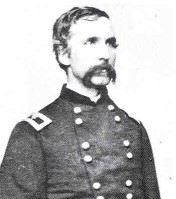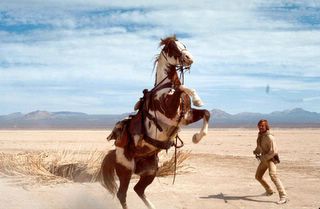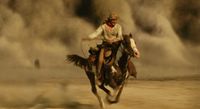
In great deeds something abides. On great fields something stays. Forms change and pass; bodies disappear; but spirits linger, to consecrate ground for the vision-place of souls.
I can't escape the Civil War, recently. Specifically, the Battle of Gettysburg. For some reason it keeps coming to me -- there is some great lesson for me in it all, so I'm trying to learn and understand...to
listen.
It started innocently, with a phone call from my brother, asking advice regarding a mutual friend who has been seeing apparitions near Gettysburg. [That is a fascinating story in itself, but not the subject of my post.] Anyway, that phone call began a series of 'Gettysburg facts' over the last few weeks, related to Providence at the battle. I guess I'd never realized the level of Divine intervention, not only in the battle, but in the exact preparation of persons and events for the battle. Phenomenal and amazing.
I now have a list of over 14 specific things, that, if any single one of them would have been different, the outcome of the battle would have been different.
One aspect of this Divine intervention is the story of Col. Joshua L. Chamberlain and the 20th Maine, under General Vincent. Chamberlain's story is riveting:
theological student, fluent in the biblical languages, brilliant mind...who sensed the call to sign up, and mastered military prowess in the process. By no accident, he drilled the 20th Maine into one of the most disciplined units in the war, training them in technique and perseverance. And, again no accident...in Divine timing, they force-marched 24 miles through the night to get to Gettysburg [by the morning of the 2nd day]. Then, they *coincidentally* marched right to the most strategic place on the battlefield,
without orders. Following their intrepid General Vincent, they went straight to Little Round Top -- which had been left unprotected -- and took up a vulnerable position on the left Union flank. Vincent immediately grasped the crucial nature of the position, and told Chamberlain to 'hold the ground at all hazards,' i.e. hold it till the death.
In less than 10 minutes, they were attacked.
The little 20th Maine held this position against all odds, 3-1 or 4-1 odds, with little sleep, and not enough ammunition. Taking 35 percent casualties, they yet held the line, Chamberlain wounded, leaning on his sword to stand and inspire the men. During the fight, the 20th performed two extremely difficult maneuvers, under fire...eventually sweeping the field, charging with fixed bayonets when their ammo ran out, capturing twice their fighting numbers in prisoners --
battle hardened Alabama boys yielding to a thin blue line that had no ammunition! In retrospect, had they cracked, had they not succeeded, the Union flank would have rolled up...the Battle of Gettysburg potentially lost.
Here is a snippet of the battle,
in Chamberlain's words:
The enemy seemed to have gathered all their energies for their final assault. We had gotten our thin line into as good a shape as possible, when a strong force emerged from the scrub wood in the valley, as well as I could judge, in two lines in echelon by the right, and, opening a heavy fire, the first line came on as if they meant to sweep everything before them. We opened on them as well as we could with our scanty ammunition snatched from the field.
It did not seem possible to withstand another shock like this now coming on. Our loss had been severe. One-half of my left wing had fallen, and a third of my regiment lay just behind us, dead or badly wounded. At this moment my anxiety was increased by a great roar of musketry in my rear, on the farther or northerly slope of Little Round Top, apparently on the flank of the regular brigade, which was in support of Hazlett's battery on the crest behind us. The bullets from this attack struck into my left rear, and I feared that the enemy might have nearly surrounded the Little Round Top, and only a desperate chance was left for us. My ammunition was soon exhausted. My men were firing their last shot and getting ready to “club” their muskets.
It was imperative to strike before we were struck by this overwhelming force in a hand-to-hand fight, which we could not probably have withstood or survived. At that crisis, I ordered the bayonet. The word was enough. It ran like fire along the line, from man to man, and rose into a shout, with which they sprang forward upon the enemy, now not 30 yards away. The effect was surprising; many of the enemy's first line threw down their arms and surrendered. An officer fired his pistol at my head with one hand, while he handed me his sword with the other. Holding fast by our right, and swinging forward our left, we made an extended “right wheel,” before which the enemy's second line broke and fell back, fighting from tree to tree, many being captured, until we had swept the valley and cleared the front of nearly our entire brigade.
Some of Chamberlain's men, and some of the captured Alabama boys, said that the ghost of General Washington fought with Chamberlain that day. Who knows about that? Simply reading the recorded destiny at work in Chamberlain is incredible, on its own. It is easy to see that God prepared him 'for such a moment as this' -- an Esther who changed history in the court of death. His acts on the battlefield were more than courageous, they were inspired.
One
military analyst said this about Chamberlain's actions:
When I consider all that Gettysburg represents, the battle comes down to a few key lessons. But perhaps the most important occurred on the second day. Col. Joshua Chamberlain and his 20th Maine were the extreme flank of the Union Army, and as the afternoon sun of July 2 began to fade into evening, the 14th Alabama gathered itself for one last assault on the rear of the Little Round Top. If the 20th Maine gave way, the Confederates would literally have been in position to roll up the side.
Chamberlain's genius was manifested that day when he demonstrated a keen understanding of the moment – an understanding of such clarity that few will experience it in a lifetime. Faced with insurmountable odds, he could not stand and fight, for he would be overwhelmed, and he could not retreat, for that would expose the entire army's flank. So, he ordered 'fix bayonets' and swept a superior foe from the field, leading a charge, which became immortal. The lesson? Audacity and courage of conviction. Providence willing, none of us will face such a supreme moment. But, if we do, knowing the story of Little Round Top may just be the insight, the lesson, that pulls us through. We speak and write about core values, but these men left a legacy that transcends our poor attempts to verbalize and give meaning. A lesson in leadership to which we should all aspire.
Amen to that!
But I think that the final word, the final lesson is best given
in the words of Chamberlain himself. On October 3rd, 1889 he spoke at Gettysburg, in dedicating the Maine monuments. There he tried to describe the immortal valor, the sacrificial deeds that remain, long after their performance:
In great deeds something abides. On great fields something stays. Forms change and pass; bodies disappear; but spirits linger, to consecrate ground for the vision-place of souls. And reverent men and women from afar, and generations that know us not and that we know not of, heart-drawn to see where and by whom great things were suffered and done for them, shall come to this deathless field, to ponder and dream; and lo! the shadow of a mighty presence shall wrap them in its bosom, and the power of the vision pass into their souls.
Wow.
In great deeds something abides. On great fields something stays. Forms change and pass; bodies disappear; but spirits linger, to consecrate ground for the vision-place of souls.
The good that we do, for the kingdom, will never die. Our prayers live before the throne. Our faithful actions endure throughout generations, echoing the Name in which they were done, continuing the great work for which they were offered...
Amen!





